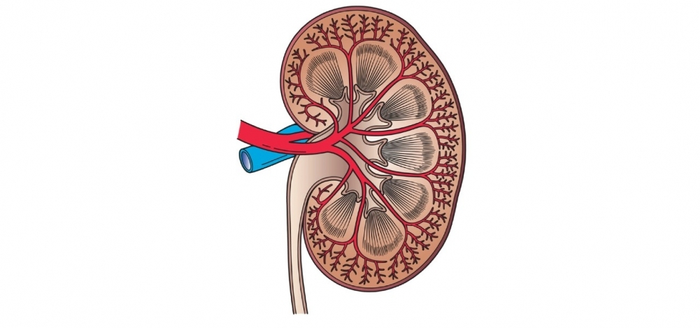A review article published in the journal Frontiers in Physiology by researchers affiliated with the Federal University of São Paulo (UNIFESP) in Brazil discusses the mechanisms whereby SARS-CoV-2 damages the kidneys, potentially serving as a basis for further research in pursuit of treatments to prevent severe renal problems and even chronic kidney disease in COVID-19 patients.

Credit: Holly Fischer/Holly Fischer/Wikimedia Commons
https://commons.wikimedia.org/wiki/File:Kidney_Cross_Section.png
A review article published in the journal Frontiers in Physiology by researchers affiliated with the Federal University of São Paulo (UNIFESP) in Brazil discusses the mechanisms whereby SARS-CoV-2 damages the kidneys, potentially serving as a basis for further research in pursuit of treatments to prevent severe renal problems and even chronic kidney disease in COVID-19 patients.
The study shows that interaction with angiotensin-converting enzyme 2 (ACE2) not only enables the virus to infect and replicate in human cells but can cause a significant imbalance in the renin-angiotensin system, which regulates arterial blood pressure, and the kallikrein-kinin system, which is involved in inflammation, control of blood pressure, and other processes.
Impairment of ACE2’s biological functions can lead to a drop in renal blood flow and a reduced glomerular filtration rate (GFR), altering the capacity of the kidneys to eliminate substances (metabolites) that are toxic in excessive quantities. It can also increase vasoconstriction in the kidneys, leading to renal function deterioration.
“Studies and systematic reviews have confirmed 20%-40% incidence of acute renal injury in COVID-19 patients. Data now being published shows that recovery is slower in some cases and complications requiring dialysis occur in others,” said Nayara Azinheira Nobrega Cruz, first author of the article.
Conducted at the university’s medical school (EPM-UNIFESP), the study was part of Cruz’s PhD research and was supported by FAPESP via three projects (18/16653-7, 17/17027-0 and 18/23953-7).
Another part of the study, analyzing data on infection by SARS-CoV-2 in pregnant women and the role of ACE2 in placenta, was also published recently in Clinical Science. It showed that pregnant women infected by the virus run a greater risk of developing pre-eclampsia, a disorder characterized by persistent high blood pressure that can cause serious harm to mother and baby (more at: agencia.fapesp.br/36662/).
The prospect of a rise in the number of cases of severe kidney injury due to the COVID-19 pandemic is a grave concern, according to Professor Dulce Elena Casarini, co-principal investigator for the study alongside José Medina Pestana, who heads EPM-UNIFESP’s Kidney Hospital (HRIM) and is a member of the São Paulo State Government’s Coronavirus Contingency Center.
“If demand for dialysis is rising now, we may see a rise in demand for kidney transplants before long,” Casarini told.
The number of kidney transplants performed in Brazil averaged a little over 5,900 per year between 2017 and 2019, according to data from the Ministry of Health, but the waiting list grew from 28,351 to 29,554 in the period.
Research by an international group of scientists published on September 1, 2021, in the Journal of the American Society of Nephrology, using data from the United States showed that seven out of every 10,000 mild or moderate COVID-19 patients required dialysis or a kidney transplant in the period March 2020 to March 2021. Among non-hospitalized patients, the risk of acute renal injury within six months of infection was 23% higher than among non-infected subjects.
Multiple functions
According to Lilian Caroline Gonçalves de Oliveira, head of UNIFESP’s Kidney and Hormone Laboratory and a co-author of the article, one of the points analyzed was the role of ACE2 in the pathogenesis of COVID-19. “The importance of the ACE2 receptor to cell invasion by SARS-CoV-2 has been known for some time. The interaction between the virus and the receptor prevents ACE2 from performing its protective functions,” Oliveira said.
The article on the study notes that the mechanism of renal involvement in COVID-19 is unknown and may be multifactorial, adding that infection by the virus may indirectly injure the kidneys via systemic inflammation, hypoxemia (low blood oxygen), shock, hypotension, and renin-angiotensin system imbalance.
The renin-angiotensin system comprises a series of reactions that help regulate blood pressure. When blood pressure falls, for example, the kidneys release the enzyme renin into the bloodstream, where it produces angiotensin 1, which is converted by ACE into angiotensin 2, an active hormone that induces vasoconstriction by acting on the wall muscles of the small arteries. Under normal conditions, a harmonious balance between ACE and ACE2 maintains renin-angiotensin system homeostasis.
Furthermore, the virus can infect kidney cells, causing damage directly, compromising the intra-renal renin-angiotensin system, and contributing to acute and long-term diseases. “Our review is a compilation that can serve as a basis for future research and shows the importance of the impact of COVID-19 on other organs besides the respiratory system,” Cruz said.
###
About São Paulo Research Foundation (FAPESP)
The São Paulo Research Foundation (FAPESP) is a public institution with the mission of supporting scientific research in all fields of knowledge by awarding scholarships, fellowships and grants to investigators linked with higher education and research institutions in the State of São Paulo, Brazil. FAPESP is aware that the very best research can only be done by working with the best researchers internationally. Therefore, it has established partnerships with funding agencies, higher education, private companies, and research organizations in other countries known for the quality of their research and has been encouraging scientists funded by its grants to further develop their international collaboration. You can learn more about FAPESP at http://www.fapesp.br/en and visit FAPESP news agency at http://www.agencia.fapesp.br/en to keep updated with the latest scientific breakthroughs FAPESP helps achieve through its many programs, awards and research centers. You may also subscribe to FAPESP news agency at http://agencia.fapesp.br/subscribe.
Journal
Frontiers in Physiology
DOI
10.3389/fphys.2021.700220
Article Title
Angiotensin-Converting Enzyme 2 in the Pathogenesis of Renal Abnormalities Observed in COVID-19 Patients
Article Publication Date
23-Aug-2021




